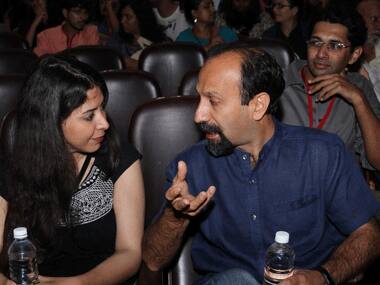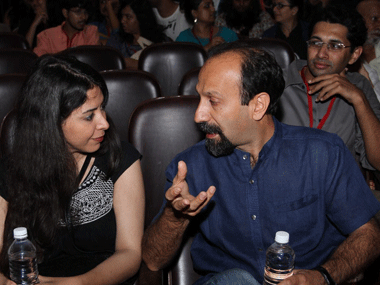There’s a lot to love at a good film festival, but what sets one apart from another isn’t the selection of films as much as the people watching those films. Audiences are the life of a festival. They go a long way in making anti-social acts like sitting in a darkened room and watching moving images on a screen into social events. For example, there we all were, waiting for the screening of Qissa to begin (it was delayed because there was an enormous queue and much confusion), when a gent sitting two seats away from me suddenly roared, “MAMI! APOLOGISE!” Everyone in his row jumped. Some looked around for the aunt who had offended him. However, there was no cowering woman and the man was glaring belligerently at the screen. Why? Because he was furious at the organisers, Mumbai Academy of Moving Images, ie MAMI. “I’ve been coming for five years. They NEVER say sorry when they start late,” said the roarer by way of explanation. “MAMI! APOLOGISE! APOLOGISE, I SAY!” he yelled again. A whole bunch of people clapped, possibly to cheer him on or maybe to shut him up. It’s difficult to tell. [caption id=“attachment_1194457” align=“alignleft” width=“380”]  Asghar Farhadi at Mumbai Film Festival, 2013.[/caption] During Medeas, there were a few snores that could be heard in the reasonably packed auditorium. This is entirely forgivable considering how abominably slow the film was. If you’re going to make a film with a plot that moves like a stoned snail and has neither dialogue nor background score, then you’ve got to be ready for people to doze off. Those who did manage to stay awake, however, would have appreciated the sharp rise in tension when there finally was a confrontation in Medeas. Except, instead of focusing on that action, we were all distracted by a conversation about whether chawli or gawaar is better for dinner. At the precise moment when things got tense in Medeas, someone said in Hindi, “Yeah, I’m busy till about 10. No, I can’t really discuss it now, I’m in the middle of something.” Everyone looked around for the offending phone-call-taker. Then we realised that the conversation was floating down from the projection booth. “I don’t like chawli for dinner,” complained the projectionist or whoever was in there with him and on the phone. “Gawaar is better. Greens are good for you. Chawli gives me gas.” Riveted by this conversation, most of us missed what happened in the one eventful scene in Medeas. My favourite conversation during a film, though, was during Blue is the Warmest Color. The Cannes winner is well-known for having one of the most graphic and lengthy sex scenes seen in cinema. It was during the first time Lea Seydoux and Adele Exarchopoulos got down to sexual congress that this conversation unfolded behind me. Woman: How much is left of the sex scene, do you think? Man: They’ve already come twice. It can’t go on for much longer. Woman: Oh, it totally can. It’s tough to distract people’s attention from two naked and beautiful woman writhing against each other, but that exchange deserves an award. I can’t think of a more succinct and telling example of how sex is comprehended differently for men and women. No penis envy here; multiple orgasms, FTW! Indian audiences also kept our reputation for asking cringe-worthy questions intact. During a masterclass with French film director Leos Carax, someone asked, “You have such long gaps between your films. How do you survive? As in, what is your subsistence? What do you do for money?” I was half expecting this gentleman to ask Carax for his credit card number next. Incidentally, Carax said in the masterclass, that he no longer watches films but as per eye witness reports, if not anything else, he has watched Blue Is The Warmest Color and Don Jon at the Mumbai Film Festival. During the Q & A with Iranian film director Asghar Farhadi, someone actually went ahead and asked him if he made films about divorce because it was autobiographical. Because of course it’s ridiculous to think that a filmmaker could actually make feature films that are entirely fictional. Cinema is, after all, a reflection of life. No? Sadly for this person, Farhadi dashed their concept of the cinema and the imagination by saying that he’s happily married with kids and not contemplating divorce. But thank god for all these people, along with the many others who yawned, burped and did other things that have no place in cinema halls. As annoying as some of them may have been at that point in time, they played an enormous part in keeping all of us festival-goers cheerful when the films themselves were breaking our hearts by being either as intense or as awful as they were. And so, the award for The Audience That is Often More Entertaining Than The Film goes to Mumbai’s cinephiles. Cheers and see you all next year.
Audiences are the life of a festival. They go a long way in making anti-social acts like sitting in a darkened room and watching moving images on a screen into social events.
Advertisement
End of Article


)
)
)
)
)
)
)
)
)



